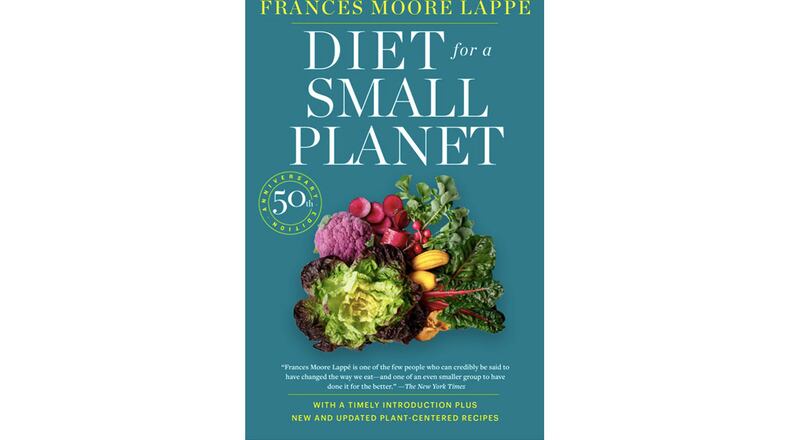“Mom, it’s just a vegetarian restaurant!”
“No, it’s not. It’s a cult!”
That mother-daughter shouting match from the late 1980s remains vivid to me. I was 16, maybe 17. All I wanted to do was eat at Govinda’s, a vegetarian buffet restaurant in St. Louis.
The sticking point was that Govinda’s was run by Hare Krishnas. My Catholic mom had a wild idea that, while I was supping on dal and rice, they would kidnap me and force me to join their religion.
My argument was that my dining partner would be Nancy Mueller, a 60-year-old divorcee who managed the office where I worked part-time. We spent a lot of time exchanging cookie recipes and baking ideas. What possibly could happen to me while I was with Nancy?
The underlying gripe, I think, was that my mother held a suspicion about the food that Nancy and I wanted to try: It was vegetarian.
My Iowan mom grew up poor, and believed that a well-rounded meal needed to include meat, a carb and a vegetable. I had little interest in meat. I got zero pleasure out of the dry, overcooked chicken she barbecued all summer. I ate what I had to, and got excused from the table.
It was around this same time that I purchased a used copy of “Diet for a Small Planet” by Frances Moore Lappé. Her thesis that meatless eating was better for our bodies, and for the Earth, resonated with me. All sorts of charts mapped out how much protein we needed, and how we could get it without consuming meat.
Credit: handout
Credit: handout
Ultimately, my mom let me go with Nancy to Govinda’s for a “radical” vegetarian lunch. It wasn’t until I was living on my own that I finally was free to explore a world of legumes, grains and fresh — not canned or frozen — produce. Lappé's book was one of the first that guided my hand in the kitchen — and, more importantly, was responsible for planting the seed of understanding that personal food choices have societal impacts.
Since its publication in 1971, “Diet for a Small Planet” has sold more than 3 million copies worldwide. The 50th anniversary edition was released in September.
Lappé turned the notion of a global food scarcity crisis on its head, arguing that ineffective food policy — not lack of food — is what causes world hunger. When the book came out, she wasn’t sure how her ideas would be received.
Credit: Michael Piazza
Credit: Michael Piazza
“I thought my message was extremely hopeful: There is enough, and we just have to use it wisely,” Lappé said during a recent phone interview. “There was very little coverage,” she noted, “but then the Boston Globe published a review that said, ‘Cookbook for a Revolution,’ and I thought, ‘Oh, somebody finally got it!’
“It’s a revolutionary idea,” said Lappé, whose name is on 20 books about world hunger, living democracy and the environment, and whose life work continues to connect what she calls “real food with real democracy.”
Half a century later, the health and ecological benefits of a plant-based diet are accepted widely. Signs of the exploding interest in what Lappé now refers to as a “plant- and planet-centered” movement are visible in the marketplace.
The metro Atlanta dining landscape is dotted with a smorgasbord of vegetarian and vegan restaurants, whose menus range from Southern to Mexican to burgers. Where tofu once was the go-to alternative protein (that could be masked as meat), grocery stores now are stocked with Impossible this and Beyond that. Plant-based cookbooks are among the hottest titles in food publishing.
In the five decades since the release of Lappé's groundbreaking book, we’ve learned so much about cooking sans meat. My early cookbook collection was comprised of titles like Mollie Zatzen’s “Moosewood Cookbook” and several by Deborah Madison. Interestingly, most of the books didn’t label themselves as vegetarian. Instead, they simply offered ways to cook with whole foods, using ingredients that didn’t include meat.
That doesn’t mean the results always were tasty.
Credit: handout
Credit: handout
In Madison’s memoir, “An Onion in My Pocket,” released in paperback in August, she discusses the progression of meatless cooking. The 1970s was an “era of stodgy, heavy, hard-to-digest, dull but meatless food. The bad rap that came with vegetarian food was well deserved. It would take time and a great deal of accumulated experience to learn to handle grains with a light touch and cook beans so that they were digestible and to explore deeply the world of vegetables,” Madison writes.
Farmers markets weren’t hip, and hippie health food stores smelled like silage, or, as Madison puts it: “something like freshly mown hay, but with the odd undertone of fermentation.”
The ’80s was a period of butter, eggs, cream and cheese, Madison recalls in the book, noting that fat was an easy fallback for vegetarian cooking. And, not just at Greens, the storied vegetarian restaurant in San Francisco, where she was founding chef, “but in restaurants everywhere.”
While Madison, author of 14 cookbooks, is hailed widely for her contributions to vegetarian cuisine, she eschews the term, and deflects the credit.
Credit: Doug Merriam
Credit: Doug Merriam
“I’m not interested in having a label attached to how I cook or eat,” she said during a phone interview from her home in the outskirts of Santa Fe, New Mexico. “Really, farmers deserve a lot of credit. They have taken leaps so many times in growing something that was not recognizable to people in the first place. That’s what really changed. The landscape of vegetables has changed since the 1950s. We had no varieties of anything. Now, we have scads of varieties. The point is, we have a lot to work with that we didn’t use to have.”
Yet, Madison thinks there is room for improvement, such as better utilizing lentils and beans. “They are so good as a side dish, with herbs and olive oil, and we never seem to see them that way,” she said.
Grains, too. “A barley salad of cooked barley, some sprouted, with a good vinaigrette and tons of herbs and whatever vegetable you want, can be delicious,” she said.
Lappé, likewise, chuckles now at the recipes published in the original “Diet for a Small Planet.” Her daughter, Anna Lappé, was the one who pointed out that 70 of the recipes called for margarine.
“Everybody was freaked out at that time for too much animal fat,” the elder Lappé recalled. Anna Lappé worked with recipe developer Wendy Lopez to refresh the recipes. The 85 updated dishes include contributions from celebrated names in gastronomy, such as Alice Waters, José Andres, Mark Bittman, Padma Lakshmi and Bryant Terry.
Lappé continues to champion change, through the interwoven issues of food and democracy. Madison just wants to see more people grow their own food, and learn to cook it.
Tensions surrounding vegetarian and vegan lifestyles still exist, and these two food pioneers want to keep their arms open. “Vegetarian, veganism — everything that’s a diet; I understand the allure of diet, but I think the harm they do is separating people from each other,” said Madison, who is not vegetarian.
“Growing up, I thought vegetarianism referred to people who did not eat meat as a way to avoid cruelty to animals,” Lappé said. “I want to honor that motive. I am suggesting that ‘plant-centered’ could include vegetarian, but it’s a broader reach, to embrace all those who want to eat in alignment with what their bodies need, and what the earth can support.”
Both of these culinary pioneers agree that food is transformative.
“Food is something we make multiple choices on every day,” Lappé said. “Food is one pathway to have more sense of power, meaning and connection in our lives.”
Read more stories like this by liking Atlanta Restaurant Scene on Facebook, following @ATLDiningNews on Twitter and @ajcdining on Instagram.
About the Author
The Latest
Featured






